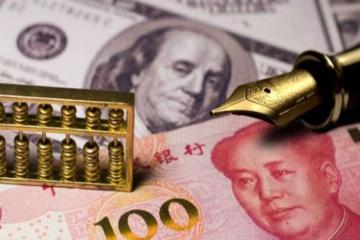A Major Shift in Global Financial Markets Ahead?
Advertisements
The dominance of the U.Sdollar has long been a subject of global scrutiny, raising questions about its implications not just for the United States but for countries that are either cozying up to it or struggling under its shadowAs such, a binary landscape appears to shape global economies: on one side are the allies—often referred to as "little brothers" of the U.S.—who enjoy some leverage within the financial system, while on the other side are those nations perceived as insignificant, often left to fend for themselves against the swirling tides of capital.
Nations in the first category, the U.S"little brothers," benefit from a certain degree of currency influenceThey tend to follow the lead of the United States, gaining advantages merely by hitching their fortunes to the American giant
Advertisements
These countries have monetary policies that often align closely with those of the U.S., allowing them to reap some benefits from the dollar's strength and the accompanying global economic stability it provides.
In contrast, the second category includes nations that struggle to maintain any semblance of stabilityLacking significant influence or resources, these countries become vulnerable to the mercurial nature of capital flowsIn the absence of a strong financial framework or the backing of a powerful ally, they face turbulence that can obliterate their economies and restrict their potential for growth.
China emerges as a notable exception in this binary worldIt stands apart from the well-established order dictated by American policies and the dollar's dominanceCurrently, the financial landscape indicates a profound shift; as the U.S
Advertisements
begins to tighten its monetary policy, China appears to be moving in the opposite directionThe global financial system and markets are entering a transformative phase where the East and West could be diverging sharply.
Let's examine recent developments more closelyThe landscape in the United States is witnessing a tightening trend, correlating with a shift in market expectations that align with reduced fiscal liquidityAn overview of external market indicators helps illuminate this situation.
Firstly, we can look at TED spreadsSince the liquidity shock observed in March 2020, TED spreads have settled into lower rangesRecent days have shown them dropping further toward record lows, reflecting reduced inter-bank lending costsAlongside this trend, the effective Federal Reserve's overnight reverse repurchase rates have also plummeted to near-zero levels.
This paints a clear picture: current liquidity conditions in the U.S
Advertisements
remain excessively loose even as expectations shiftThe implications are profound, as they hint at the arrival of a new economic structure where liquidity management might soon tighten—marking the edges of a broader transition.
Meanwhile, on the Chinese front, the government appears committed to a looser monetary postureFor instance, on June 24, the People's Bank of China (PBOC) initiated a 300 billion yuan seven-day reverse repurchase operation, a notable uptick from previous amountsThis move is indicative of a conscious strategy to inject liquidity into its banking system, in direct contrast to the ongoing U.SwithdrawalObservations point to a sharp decline in interbank rates, with significant movements in repo rates suggesting a softening stance by the PBOC.
This juxtaposition where the U.S
- Slowdown in Indian Manufacturing Hinders Growth
- BYD Shares Rise While Tesla Stock Dips
- Definition and Types of International Capital Flows
- Gold Surpasses $2,700 Threshold
- Latin America Faces Urgent Call for Structural Reforms
tightens its belts while China loosens its at the same time constitutes a significant shiftThe divergence can be attributed to how China perceives its role in the world economy—seeking to minimize the adverse effects of American monetary policies while ensuring its own economic stability.
Historically, the relationship between the U.Sand emerging markets has often been characterized by a pattern of synchronizationWhen the Federal Reserve operates in expansionary mode, many emerging nations feel compelled to follow suitHowever, addressing this current juncture reveals a scenario fraught with challengesWhile the U.Spushes through its recovery, disparities emerge between it and other economies, potentially leading to adverse impacts for those reliant on American guidance.
In theory, when the dollar strengthens, many countries, including China, would generally experience economic backlash: capital outflows, currency depreciation, and weakened international trade

However, China's response has been strategicBy steering its monetary policies toward moderate loosening, it aims to insulate itself from the fallout caused by the U.S.'s tightening measures and weather the storm that might otherwise devastate its economic fabric.
A vital factor in China's monetary strategy involves careful calibration to avoid exacerbating inflationary pressuresThe contradiction between U.Sand Chinese monetary policies signifies a larger conflict in global economic governanceWhile the U.Sseeks to stabilize its own economy post-pandemic through tightening, China's proactive liquidity measures suggest an awareness of its unique position and responsibilities as a global manufacturing powerhouse.
China's status as an export giant makes it a crucial player in determining global pricing dynamics, especially in the face of increasing commodity costs driven by American monetary policies
With inflation running rampant in the U.S., China must take heed of its own growth trajectory to avoid succumbing to pressures that could hinder its long-term strategic goals.
In summary, the financial strategies of both nations represent far more than simple policy decisions—they encapsulate differing visions of global economic integrationAs we wrestle with these economic realities, it becomes evident that the path forward will necessitate careful consideration of how these diverging policies will shape the future of global financial markets.
Therefore, amidst a backdrop of shifting dynamics, we may well witness the emergence of a new economic paradigm where the best assets could manifest in China as it navigates these turbulent waters with a keen sense of reform and adaptability.
Leave a comment
Your email address will not be published